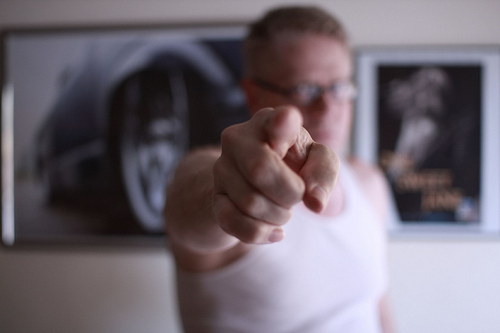When it comes to relationship and communication, the devil is in the details.
The words spoken are massive influences in determining the course of dialogue. Words are so important that they have even been recognized as a primary love language, being able to build a person up and have them feel loved, or destroy them and feel abused. And when it comes to loving language, two simple words can convey a whole different meaning, and generate responsiveness or defensiveness.
You and I are words usable in a variety of contexts and can lead conversations down different paths.
My yoga teacher once told me that when communicating, do not raise a person’s defenses. Communication and being understood is hard enough. Once defenses have been raised there is then an additional effort required to work with the defenses. And until the defenses are negotiated, communication cannot happen.
When trying to find common ground, defensiveness can be a massive obstacle to understanding.
And nothing can raise defenses in communication faster than the word “you.”
The word “you” can be empowering or destructive. When used with positive language, a person can be built up, feel seen, appreciated and loved. It is when used with anger, frustration and negativity that “you” becomes one of the most harmful words ever. “You” can put a loved one in a cage of perceptions, and can be a judge, jury and executioner. Often times “you” can smack of projection, and when used falsely, can cut deeply and undermine trust.
The word you is a labeling mechanism. “You are this way,” “You are that way.” This smacks of judgment, blame and communicates aggression.
The word you is accusatory. “You did this and that.” And while whatever was done may be true or false, this will always raise defenses. Nobody wants to be accused, especially falsely.
The word you is blaming and shaming. “You never listen.” “You are thoughtless.” And while saying something like that may be true at times, it is never true at all times.
The word you cuts. “You are ugly. You are not a woman. You are not a man.” It can undermine a person’s self-esteem and erode their image when used over and over again.
“You” is often a fighting word and in heated conversation, will always create defensive reactions.
The word you can be harmful in many more ways. It really depends on the situation. It can be liberating, yet more often than not the word you will only cause a person to be defensive.
The person who can surrender their defenses and be vulnerable is rare. So it is better to not raise defenses and take responsibility for personal feelings with the liberating word, I.
When two people who trust each other try and communicate, the best that can be hoped for is to communicate where I stand, and to be heard and responded to. If I do not communicate how I feel, or share my perspectives, then it is my failing and lack of trust that is causing issues. If I am being open and expressing myself, then I have done the best that is possible. I liberate the other person from being responsible for my emotions, and maintain personal integrity and power.
If the other person cannot respond and take personal responsibility, if they are unwilling to listen or negotiate, that is a whole different can of worms. All I can do is my personal best, in the moment.
Using the word I can be difficult, it places personal responsibility and feelings upon oneself. It puts the self in the spot-light and is exceptionally vulnerable. The word “I” is a way of trusting the other to see oneself clearly, and gives the ability to adjust as conversations and life happen.
The word “I” precedes every thought of identification and personality. Everything after “I” changes.
“I am old. I am young. I feel angry. I feel happy. I feel sick. I feel great.” The only constant in all those phrases is “I”. And everything afterward changes in time.
I am able to speak from my soul, and honor that everything can change. The feelings of not being heard, or hurt, or abandoned, or unloved, can all change. The “I” that is my soul can remains.
So when facing another person, though the word “I” can be vulnerable, it also has a great strength in it. Behind that I resides the soul, the spirit of who is speaking. And with responsibility comes a responsiveness to language, feelings, environments and situations that is expansive and liberated from defensiveness.
It is a brave person who can say, “I don’t feel heard.” That kind of phrase generates a whole different response than saying “you never listen to me.” Or, “I feel uncomfortable when you see so and so, or speak in such ways to people” creates a safe space for response, where saying “you betray me when sharing our intimacies,” or “you are cheating on me.”
A lot of assumptions go into the word you. A language of trust uses the word I.
When facing difficult times, it is natural to want the other person to take responsibility for their actions and ways that they have caused pain.

But most often, a loved one will know that they have caused harm and may be feeling guilt and shame for the pain that they’ve caused. If they don’t feel that kind of remorse, then there’s a good chance that they do not understand, or may not even care. Yet if they do, “you” will only make that guilt rise up and defend the ego. And while it’s a nice ideal to think people can take responsibility all the time, certain kinds of language can support others in facing their shadow.
Rather than forcing acquiescence, trusting in the others ability to self-observe and speak their truth, to take responsibility, is liberating for all involved.
And the only way to do that is to communicate ones own state of existence and experience first.
This requires a certain level of self-inquiry, internal trust and self-value. Because without internal knowledge, in absence of the ability to look within and identify and self-regulate, there is no opportunity for I to speak its truth. The personal trust first be known and experienced to speak that truth.
A closing affirmation: I trust in my intuition and life experiences and am empowered to speak my truth and accept responsibility for my words and actions.
Love elephant and want to go steady?
Sign up for our (curated) daily and weekly newsletters!
Editor: Catherine Monkman
Photo: rocketjim54/Flickr, elephant journal archives












Read 0 comments and reply